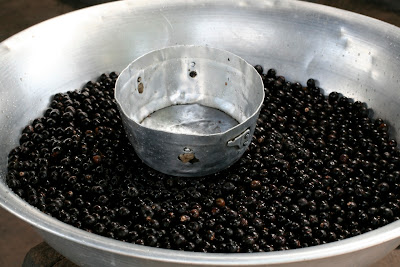 |
| Acai berries before being processed |
The acai berry is said to cure cancer, burn fat, lower blood pressure, eliminate toxins (more on these mysterious toxins soon!), treat arthritis, lower cholesterol and even cure erectile dysfunction. Call me a cynic, but any food product marketed as a cure for sexual dysfunction automatically goes onto my “overhyped foodstuffs” list. Oprah agrees with me; the Oprah Winfrey and Dr. Oz Shows, along with Dr. Mehmet Oz, filed a trademark infringement complaint against 40 Internet marketers of dietary supplements, including acai berry products, after they repeatedly and falsely claimed that Oprah had endorsed their products.
So what exactly is the exotic sounding acai berry? It is the fruit of a palm tree (Euterpe oleracea) that grows in the swamps and floodplains of South America from Brazil to Peru. The tree has long been cultivated in Brazil for its berries and for its hearts, eaten as a vegetable salad ingredient. The fruits are about one centimetre in circumference and grow in bunches of up to 1,000. They are blackish purple when ripe and are said to taste of a mixture of chocolate and red wine. Because about 80% of each berry is made up of an inedible seed and the ripe fruit rot within 24 hours of picking, acai berries are almost always processed into a powder, puree or juice.
As for nutritional value, the fresh acai berry does have a lot going for it. It is rich in oils and has been an important source of food to the Caboclo people of the Brazilian Amazon for thousands of years. It still forms an important part of the Amazonian diet today. Although there are lots of figures floating around, exact nutritional information for the acai is hard to come by. Wikipedia gives the following info for 100 grams of freeze dried acai pulp and skin;
Kcal: 533.9 Kcal,
Dietary Fibre: 44.2 g
Vitamin C: Negligible
Vitamin A: 1002 IU (33% RDI)
Calcium 260 mg (37% RDI)
A respectable set of figures but no better than many seasonal and locally grown fruits and berries that don’t need to be flown in from the Amazon. And no vitamin C; a tried and tested antioxidant!
Most sellers of acai products quote the incredibly high antioxidant content of the acai. Is this true or just another example or marketing hype;
An independent analysis found that acai has intermediate antioxidant potency; among 11 varieties of frozen juice pulps it scored lower than acerola, mango, strawberry, and grapes. A study at the Centre for Human Nutrition at the University of California compared the antioxidant capacity of a number of beverage products and found that acai rated lower than pomegranate juice, red wine, Concord grape juice, blueberry juice and black cherry juice.
Sellers also mention the acai berry’s huge oxygen radical absorbance capacity (ORAC) score, caused by high anthocyanin and flavonoid levels. This sounds great but what does it mean? Phytochemicals such as anthocyanin may be powerful antioxidants in the test tube but no scientific study has yet found that this is duplicated inside the human body. In the US and Europe it is currently it is illegal to imply potential health benefits on package labels of products with high ORAC.
Both the US Food and Drug Adminstration and European Food Safety Authority warn consumers that no food compounds other than vitamins A, C and E have been proved with antioxidant efficacy in vivo. Anthocyanins and other flavonoids might be good for you but they might do nothing at all.
It isn’t all doom and gloom for the acai; Texas AgriLife Research scientists found that the antioxidants present in the berries do have an effect on the body rather than just passing through the digestive system. Whether this effect is due to the Vitamin A or some other as yet unidentified antioxidant remains unknown.
Of all the potential super foods, it seems that the acai berry is the one that internet marketers and nutritional gurus have seized on to promote, often at high prices and accompanied by ridiculous claims. Whether you are convinced or not about the superfood status of the acai berry, common sense dictates that it is better to get hold of the frozen puree or whole berries than it is to pay for processed powder or juices. The scientific evidence suggests that you would be better off with a bunch of red grapes or a glass of pomegranate juice. Or an apple!
SUPERFOOD RATING: 4/10
Antioxidant Potency of Fruit Juices:
Wild fruits and pulps of frozen fruits: antioxidant activity, polyphenols and anthocyanins
Research shows Brazilian acai berry antioxidants absorbed by human body
Consumption of flavonoid-rich foods and increased plasma antioxidant capacity in humans: Cause, consequence, or epiphenomenon?
No comments:
Post a Comment